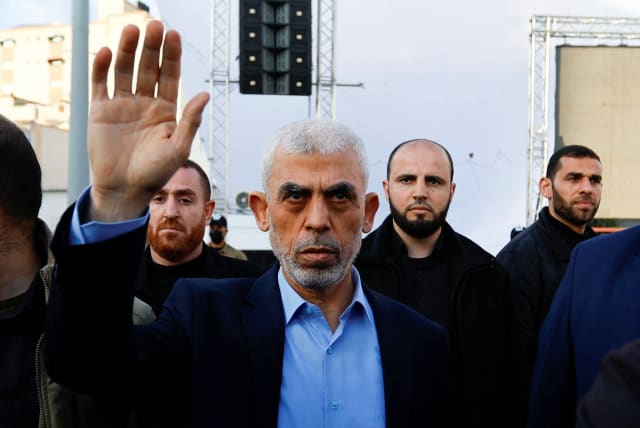Yahya Sinwar's 1989 interrogation reveals Hamas leader's cruelty, ruthlessness

Yahya Sinwar's interrogation transcripts from 1989 provide a glimpse into the Gaza Hamas leader's cruelty, and his willingness to risk the lives of his people and family without batting an eyelid.
Cruelty, suspicion, and complete indifference to the suffering of his family and his people—these are some of the qualities that are revealed when reading the testimony of Yahya Sinwar, the leader of Hamas in Gaza, from his days as a young and particularly dangerous operative in the ranks of the terrorist organization.
The qualities cited here were referenced by Sinwar during a recently revealed police interrogation in 1989. His quotes give a glimpse into the dark personality of the master terrorist, who did not hesitate to harm his people or anyone he considered to be an apostate from the religion of Islam or a collaborator with Israel.
A chilling illustration of this can be found in the testimony concerning the murder committed by Sinwar—of a collaborator with Israel named Rami Salim.
"I strangled him with a kaffiyeh"
In order to get the "authorization" to kill Salim, Sinwar turned to the leader of Hamas, Sheikh Ahmed Yassin. Salim was subjected to a violent interrogation at the hands of Sinwar, and confessed to having ties with the Israeli security forces as well as violating religious principles.

In his investigation, Sinwar described Salim's execution: "On the way I blindfolded him with a rag, so that he wouldn't see where we were going. At the cemetery I put Rasmi into the big grave... and there I strangled Rasmi with a kaffiyeh I had. Then I suffocated him, wrapped him in a white cloth, in a shroud, and then I went out and closed the grave."
The same was true of another person, named Adnan Azfur, whom Sinwar also suspected of having connections with Israel.
"We interrogated Adnan, beat him and talked to him, and then he admitted that he was connected with the Israeli intelligence... then we decided to kill him... and there I strangled Adnan by force, and I... dug in the place, and we buried him there, and we each went to our homes."
In his statement to the police, Sinwar described how the information reached him: "We received information about one Fathi Issa, from the al-Birij refugee camp, who was cooperating with the authorities." Sinwar followed him, kidnapped him, and brought him to an orchard for an 'interrogation'. 'I stayed with Fakhri and started questioning him. I grabbed his throat with one hand and started choking him, and with the other hand I punched him in the stomach, then suddenly he had a heart attack and died," Sinwar told his investigators.
Another person who did not escape Sinwar's clutches was a man named Hossein al-Sir Mahan Yun. This is how Sinwar described his exploits to the police: "While they were threatening Hossein al-Sir, as he started to get out of the car and started to resist, I pressed the gun to his neck so that he would get into our car. Then a bullet was fired from my gun and hit him."
Sinwar tested bombs—on Al-Shifa Hospital
Another example of the indifference of the Hamas leader in Gaza to the lives of his people can be found in the following story: In 1987, Sinwar wanted to experiment with dropping explosive charges. Of all places, he chose Shifa Hospital in Gaza City as a dummy target, which has since become a symbol of Hamas's cynicism and the willingness of it and its leaders—who according to reports are or at least were hiding under the hospital—to use the civilian population as a human shield. The explosive device did explode.
The quotes that appear here are taken from a High Court decision that rejected the request of Sinwar's father, Ibrahim Hassan Sinwar, that his house not be destroyed due to his son's criminal acts. The retired president of the Supreme Court, Meir Shamgar, rejected the petition with the following prophetic words:
"The severity of Yahya's actions, described above, who strangled to death, with his own hands, people suspected of cooperating with the authorities, is the background to the decision of the respondent, who considered and believed that in this case the adoption of punitive measures is required. There is no reason to deny the reasonableness of this step.
"Indeed, the members of Yahya's family are also now suffering because of his actions," Shamgar wrote, "but this is indeed, more than once, the side effect of any punishment (such as imprisonment or even a fine), which is indeed imposed on the accused, but which hurts—no less and sometimes even more—those who depend on him. This alone cannot be used to negate the justification of an act of deterrent punishment, which appears to the respondent to be essential in order to fulfill his duties and responsibilities. The petition is dismissed."
